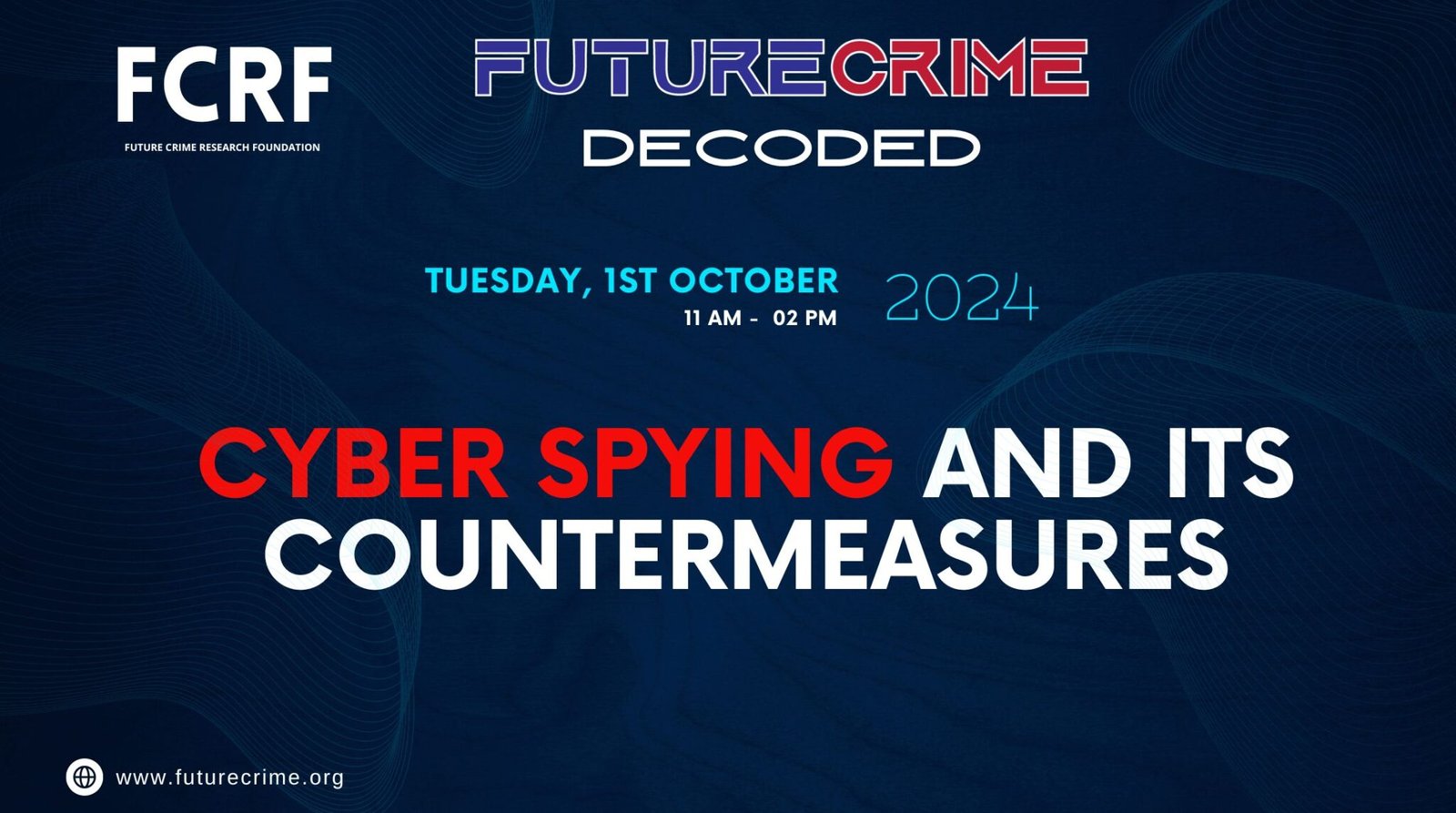The Future Crime Research Foundation (FCRF) recently held a timely webinar on “Cyber Spying and Countermeasures,” bringing together leading cybersecurity professionals to address the growing threat of digital espionage. The session, packed with actionable insights, provided attendees with a clear understanding of the latest tactics employed by attackers and the essential tools needed to defend against them.
The event featured notable speakers, including Akash Rosen, Digital Forensics Expert at ReSecurity, Dr. Malvika Mehta, Crypto Crime Investigator, Kuldeep Sonar, Principal Corporate Trainer & Consultant, and Naveen Singh, a Cybersecurity Expert. These experts discussed the latest trends in cyber spying and provided critical strategies for safeguarding against such attacks.
Latest Cyber Threats and Live Demonstrations
During the session, Naveen Singh demonstrated the ease with which commonly available spying tools, often sold on e-commerce platforms, can be used to infiltrate personal and corporate devices. His live demonstration highlighted the increasing sophistication of these tools and the urgency for heightened digital security awareness.
Similarly, Akash Rosen showcased advanced forensics tools he used in a recent investigation, offering attendees a behind-the-scenes look at how cybercrime investigators unravel complex cyber espionage cases. His presentation demonstrated how attackers exploit vulnerabilities and how cybersecurity professionals can stay one step ahead.
ALSO READ: Join The Movement: Registration Open for ‘Cyber Safe Uttar Pradesh’ Event by FCRF on October 17
Dr. Malvika Mehta provided a detailed overview of the vulnerabilities that make systems susceptible to cyber spying. She emphasized that phishing and social engineering remain among the most common entry points for cyber espionage. According to Dr. Mehta, phishing attacks trick users into revealing sensitive information by mimicking legitimate communications.
“Phishing is one of the most common entry points for cyber spies,” Dr. Mehta explained, urging organizations to train their employees to spot such attacks.
Malware: A Hidden Weapon
Dr. Mehta also discussed how malware, often disguised as gifts or legitimate software updates, is used by attackers to infiltrate systems and conduct surveillance. She referenced high-profile cases like Pegasus, a powerful spyware tool that allows attackers to spy on activities, steal data, and manipulate devices such as security cameras and webcams.
Recognizing Spyware Symptoms
A significant part of Dr. Mehta’s session was focused on recognizing the signs of spyware infections. Symptoms like a sudden decrease in device performance, unexpected pop-ups, or unfamiliar apps running in the background could indicate spyware. She advised conducting regular security audits and checks to identify breaches early.
Counterspy Measures and Cybersecurity Tools
Dr. Mehta shared a range of counterspy measures to defend against cyber espionage, recommending cybersecurity tools such as OPSWAT, Zimperium, and JamF. These tools offer proactive defenses, detecting and preventing malware attacks while ensuring control over digital environments.
“Your digital space is as valuable as your physical space. Protect it with vigilance and the right tools,” she stressed.
Kuldeep Sonar: Unmasking the Tools of Cybercriminals
Kuldeep Sonar, a leading cybersecurity trainer, highlighted the growing threat of cyber espionage, emphasizing how cybercriminals use sophisticated tools to breach both organizational and personal security. He warned that as cyberspy tactics evolve rapidly, constant vigilance is essential.
One of the most eye-opening sections of Sonar’s presentation focused on Shodan, a tool often called the “search engine for the Internet of Things (IoT).” He demonstrated how attackers use Shodan to identify unsecured devices such as webcams, routers, and industrial control systems, particularly in critical industries like healthcare and energy.
“Exposed devices are easy targets for attackers using Shodan to find weaknesses,” Sonar remarked, urging industries to prioritize securing their IoT devices.
Email Spoofing and Flipper Zero
Sonar also explored the dangers of email spoofing, particularly through services like Emkie.cz, which attackers use to send deceptive emails for phishing and fraud. He stressed the importance of implementing email authentication protocols like SPF, DKIM, and DMARC to combat these threats.
Additionally, Sonar introduced attendees to the Flipper Zero, a versatile hacking tool that can be misused to clone access cards, intercept NFC transactions, and manipulate wireless devices. He warned that while Flipper Zero was developed for penetration testing, it poses significant risks if used maliciously.
USB Rubber Ducky: A Silent Threat
Another alarming tool presented by Sonar was the USB Rubber Ducky, a device that appears as a regular USB drive but is, in fact, a programmable keystroke injector. He demonstrated how attackers use this tool to steal credentials, install malware, or even enable remote surveillance without the victim’s knowledge.
“USB Rubber Ducky can be plugged in and start spying within seconds,” Sonar explained, advising organizations to secure their USB ports and educate employees on the dangers of unfamiliar devices.
Government Tools to Strengthen Cybersecurity
In addition to highlighting cybersecurity threats, Sonar pointed to several Indian government initiatives designed to combat cyber spying. He introduced attendees to the Cyber Swachhta Kendra (csk.gov.in), a platform providing free tools to clean infected devices, and the National Cyber Crime Reporting Portal (cybercrime.gov.in), which enables citizens to report cybercrimes. Sonar also discussed Sanchar Saathi (sancharsathi.gov.in), a government portal aimed at tackling mobile theft and SIM misuse.
The webinar underscored the importance of staying proactive in the fight against cyber espionage. The expert presentations provided valuable insights into the latest trends in cyber spying and the tools available to counter these threats. FCRF’s ongoing commitment to raising cybersecurity awareness and equipping stakeholders with practical solutions remains a crucial resource for organizations across sectors.
The Future Crime Research Foundation continues to lead the charge in helping businesses and individuals safeguard their digital assets from cyber threats.



